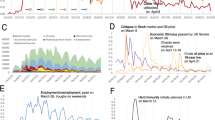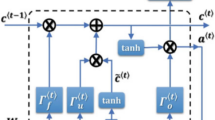Abstract
The outbreak of coronavirus disease 2019 (COVID-19) recently has affected human life to a great extent. Besides direct physical and economic threats, the pandemic also indirectly impact people’s mental health conditions, which can be overwhelming but difficult to measure. The problem may come from various reasons such as unemployment status, stay-at-home policy, fear for the virus, and so forth. In this work, we focus on applying natural language processing (NLP) techniques to analyze tweets in terms of mental health. We trained deep models that classify each tweet into the following emotions: anger, anticipation, disgust, fear, joy, sadness, surprise and trust. We build the EmoCT (Emotion-Covid19-Tweet) dataset for the training purpose by manually labeling 1,000 English tweets. Furthermore, we propose an approach to find out the reasons that are causing sadness and fear, and study the emotion trend in both keyword and topic level.
Access this chapter
Tax calculation will be finalised at checkout
Purchases are for personal use only
Similar content being viewed by others
Notes
- 1.
- 2.
- 3.
- 4.
- 5.
https://github.com/huggingface/transformers: bert-base-multilingual-cased model.
- 6.
Visualization tool: https://wordart.com/. Invalid for a few languages.
References
Abidin, T.F., Hasanuddin, M., Mutiawani, V.: N-grams based features for Indonesian tweets classification problems. In: 2017 International Conference on Electrical Engineering and Informatics (ICELTICs), pp. 307–310. IEEE (2017)
Althoff, T., Clark, K., Leskovec, J.: Large-scale analysis of counseling conversations: an application of natural language processing to mental health. Trans. Assoc. Comput. Linguisti. 4, 463–476 (2016)
Blei, D.M., Ng, A.Y., Jordan, M.I.: Latent Dirichlet allocation. J. Mach. Learn. Res. 3(Jan), 993–1022 (2003)
Calvo, R.A., Milne, D.N., Hussain, M.S., Christensen, H.: Natural language processing in mental health applications using non-clinical texts. Nat. Lang. Eng. 23(5), 649–685 (2017)
Devlin, J., Chang, M.W., Lee, K., Toutanova, K.: BERT: pre-training of deep bidirectional transformers for language understanding. arXiv preprint arXiv:1810.04805 (2018)
Dini, L., Bittar, A.: Emotion analysis on Twitter: the hidden challenge. In: Proceedings of the Tenth International Conference on Language Resources and Evaluation (LREC 2016), pp. 3953–3958 (2016)
Go, A., Bhayani, R., Huang, L.: Twitter sentiment classification using distant supervision
Hasan, M., Rundensteiner, E., Agu, E.: Emotex: detecting emotions in Twitter messages (2014)
Larsen, M.E., Boonstra, T.W., Batterham, P.J., O’Dea, B., Paris, C., Christensen, H.: We feel: mapping emotion on Twitter. IEEE J. Biomed. Health Inform. 19(4), 1246–1252 (2015)
Mohammad, S.M., Sobhani, P., Kiritchenko, S.: Stance and sentiment in tweets. ACM Trans. Internet Technol. (TOIT) (2017)
Mohammad, S.M., Turney, P.D.: Crowdsourcing a word-emotion association lexicon. Comput. Intell. 29(3), 436–465 (2013)
Pandey, A.C., Rajpoot, D.S., Saraswat, M.: Twitter sentiment analysis using hybrid cuckoo search method. Inf. Process. Manag. 53(4), 764–779 (2017)
Qi, P., Zhang, Y., Zhang, Y., Bolton, J., Manning, C.D.: Stanza: a Python natural language processing toolkit for many human languages (2020)
Ritter, A., Clark, S., Etzioni, O., et al.: Named entity recognition in tweets: an experimental study. In: Proceedings of the Conference on Empirical Methods in Natural Language Processing, pp. 1524–1534. Association for Computational Linguistics (2011)
Zhang, M., Zhou, Z.: A review on multi-label learning algorithms. IEEE Trans. Knowl. Data Eng. 26(8), 1819–1837 (2014)
Author information
Authors and Affiliations
Corresponding author
Editor information
Editors and Affiliations
Rights and permissions
Copyright information
© 2020 Springer Nature Switzerland AG
About this paper
Cite this paper
Li, I., Li, Y., Li, T., Alvarez-Napagao, S., Garcia-Gasulla, D., Suzumura, T. (2020). What Are We Depressed About When We Talk About COVID-19: Mental Health Analysis on Tweets Using Natural Language Processing. In: Bramer, M., Ellis, R. (eds) Artificial Intelligence XXXVII. SGAI 2020. Lecture Notes in Computer Science(), vol 12498. Springer, Cham. https://doi.org/10.1007/978-3-030-63799-6_27
Download citation
DOI: https://doi.org/10.1007/978-3-030-63799-6_27
Published:
Publisher Name: Springer, Cham
Print ISBN: 978-3-030-63798-9
Online ISBN: 978-3-030-63799-6
eBook Packages: Computer ScienceComputer Science (R0)




